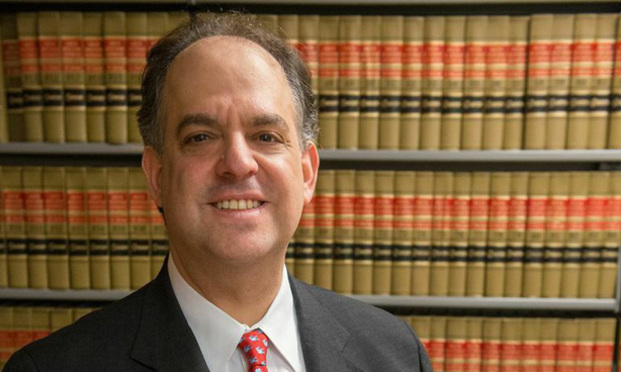Anthem Lawyers Defending Their Fees Say Objector Has Conflict of Interest
The objector, Adam Schulman, is an attorney at the Competitive Enterprise Institute's Center for Class Action Fairness, where Ted Frank, a known class action critic, is the director.
May 23, 2018 at 05:52 PM
6 minute read
 Ted Frank of the Center for Class Action Fairness/photo by Talya Arbisser
Ted Frank of the Center for Class Action Fairness/photo by Talya Arbisser
Plaintiffs attorneys defending a $38 million fee request in the Anthem data breach settlement lashed out at an objector for having a conflict of interest because he works for his own lawyer, Ted Frank, a known class action critic.
The objector, Adam Schulman, is an attorney at the Competitive Enterprise Institute's Center for Class Action Fairness, where Frank is the director. In objecting to the fee request, Schulman successfully asked for a special master, whose report last month lopped off $9 million from the request due to potentially duplicative billing and inflated rates for 33 contract attorneys.
Both Schulman and the plaintiffs attorneys objected to the report. In a response filed Monday to Schulman's objection, plaintiffs attorneys defended their billing rates and insisted that case law backed up their fee request, which is 33 percent of the $115 million fund. But they also said Schulman's continued objections were based on his group's ideological agenda, not the interests of class members.
“In this case, the private interests of Schulman, his attorney (Frank), and the Competitive Enterprise Institute conflict with the interests of the class,” plaintiffs attorneys wrote. “An independent, adequate objector or objector's counsel is obligated to weigh the value to the class of providing immediate relief against the risks and delays to the class of further litigation. But this objector and his attorney are conflicted and cannot fairly and adequately speak for the class.”
In an email, Frank wrote: “It's a frivolous argument and a sign of desperation that half of their brief is taken up with ad hominems.”
U.S. District Judge Lucy Koh has set a hearing for June 14.
The filing is the latest to address special master James Kleinberg's report. Koh, in San Jose, California, appointed Kleinberg, a retired Santa Clara County Superior Court judge, as special master after stating she was “deeply disappointed” that lead plaintiffs attorneys had brought in an additional 49 plaintiffs law firms on the case. Eve Cervantez of Altshuler Berzon and Andrew Friedman of Cohen Milstein Sellers & Toll were co-lead counsel in the case, while Eric Gibbs of Girard Gibbs and Michael Sobol of Lieff Cabraser Heimann & Bernstein served as members of the plaintiffs steering committee.
In their response, plaintiffs attorneys insisted that, despite numerous academic reports to the contrary, some judges in settlements of more than $100 million have not lowered the percentage of the fund on which fee awards are based.
Brian Fitzpatrick, a professor at Vanderbilt University Law School, whose own academic research often gets cited in disputes over fees in class action settlements, said there are good reasons to depart from that precedent.
“I think it is a mistake to follow this practice—it is not supported by economic theory, but only, as far as I can tell, some sort of concern with public perception,” he wrote in an email.
Plaintiffs attorneys added that Schulman and Frank have financial and professional interests that pose conflicts of interest in their continued objection to the fees. Just as named plaintiffs cannot be employees of their attorneys in a class action, such protections should govern Schulman's relationship to his lawyer, they wrote. They noted that attorneys at Frank's group have filed at least 24 objections in which an employee or board member of the Competitive Enterprise Institute was their client.
“It is little wonder, then, that in lambasting the special master, Schulman and Frank continue to ask the court to penalize plaintiffs' counsel, even though the special master, while disagreeing with certain aspects of plaintiffs' fee request, found no misconduct,” they wrote.
In his email, Frank brushed off the conflict claims.
“As evidence of our 'ideological conflict' they cite over a dozen cases we won, with tens of millions of dollars of additional benefit to the class, plus one where the Supreme Court granted certiorari for the October 2018 term,” he wrote. “We face personal attacks in about 90% of our objections. Until courts start sanctioning such behavior, I imagine we'll keep seeing that sort of abuse.”
Plaintiffs lawyers in other cases have raised similar criticisms about Frank's organization or Frank, who has also objected on behalf of himself in some cases. In the $5.5 million class action settlement with Google over privacy issues relating to the use of cookies, for instance, plaintiffs attorneys said Frank and his group were “engaged in a public crusade against class actions” with financial contributions from numerous corporations.
And in a $10.8 million class action settlement with a retailer that does business as Wines 'Til Sold Out, plaintiffs attorney James Cecchi of Carella, Byrne, Cecchi, Olstein, Brody & Agnello in Roseland, New Jersey, insisted that conservative donors have allowed Frank and the Competitive Enterprise Institute “to make a career out of carpet-bombing class action settlements.” In an interview, Schulman said at the time: “It's a function that we're jeopardizing a multimillion dollar fee from plaintiffs counsel, so they're angry. They let that anger seep into their filings.”
In that case, the U.S. Department of Justice also filed a statement of interest opposing the deal but changed its mind following some revisions to the settlement. U.S. District Judge Renée Bumb in New Jersey ultimately rejected the settlement, citing too many unanswered questions.
In the Anthem case, Frank filed his own response on Monday on behalf of Schulman that continued to argue the $360 per hour charged for contract attorneys in the fee request, which the special master reduced to $156, was far beyond the market rates. He again cited a separate special master's report, a redacted version of which is due May 31, in class action settlements with State Street in which the rates of contract attorneys, including three who also were in the Anthem case, were at issue. The special master in that request reviewed a $75 million fee request by Lieff Cabraser and two other plaintiffs firms for potential overbilling.
He insisted that other judges would have reduced the fee award to between 10 percent and 20 percent of the settlement fund and attacked a declaration filed by plaintiffs' expert William Rubenstein, a Harvard Law School professor tasked last year with reviewing a $112.5 million fee request in the NFL concussion case.
“Rubenstein merely does what lawyers do every day in our common law legal system: compare this case with previous cases to argue that plaintiffs' request complies with the law,” he wrote.
This content has been archived. It is available through our partners, LexisNexis® and Bloomberg Law.
To view this content, please continue to their sites.
Not a Lexis Subscriber?
Subscribe Now
Not a Bloomberg Law Subscriber?
Subscribe Now
NOT FOR REPRINT
© 2025 ALM Global, LLC, All Rights Reserved. Request academic re-use from www.copyright.com. All other uses, submit a request to [email protected]. For more information visit Asset & Logo Licensing.
You Might Like
View All
Growth of California Firms Exceeded Expectations, Survey of Managing Partners Says
5 minute read
Google Makes Appeal to Overturn Jury Verdict Branding the Play Store as an Illegal Monopoly
5 minute read
Eight Years On, A&O Shearman’s Fuse Legal Tech Incubator Is Still Evolving
4 minute read
Chicago Law Requiring Women, Minority Ownership Stake in Casinos Is Unconstitutional, New Suit Claims
5 minute readTrending Stories
- 1New York State Authorizes Stand-Alone Business Interruption Insurance Policies
- 2Buyer Beware: Continuity of Coverage in Legal Malpractice Insurance
- 3‘Listen, Listen, Listen’: Some Practice Tips From Judges in the Oakland Federal Courthouse
- 4BCLP Joins Saudi Legal Market with Plans to Open Two Offices
- 5White & Case Crosses $4M in PEP, $3B in Revenue in 'Breakthrough Year'
Who Got The Work
J. Brugh Lower of Gibbons has entered an appearance for industrial equipment supplier Devco Corporation in a pending trademark infringement lawsuit. The suit, accusing the defendant of selling knock-off Graco products, was filed Dec. 18 in New Jersey District Court by Rivkin Radler on behalf of Graco Inc. and Graco Minnesota. The case, assigned to U.S. District Judge Zahid N. Quraishi, is 3:24-cv-11294, Graco Inc. et al v. Devco Corporation.
Who Got The Work
Rebecca Maller-Stein and Kent A. Yalowitz of Arnold & Porter Kaye Scholer have entered their appearances for Hanaco Venture Capital and its executives, Lior Prosor and David Frankel, in a pending securities lawsuit. The action, filed on Dec. 24 in New York Southern District Court by Zell, Aron & Co. on behalf of Goldeneye Advisors, accuses the defendants of negligently and fraudulently managing the plaintiff's $1 million investment. The case, assigned to U.S. District Judge Vernon S. Broderick, is 1:24-cv-09918, Goldeneye Advisors, LLC v. Hanaco Venture Capital, Ltd. et al.
Who Got The Work
Attorneys from A&O Shearman has stepped in as defense counsel for Toronto-Dominion Bank and other defendants in a pending securities class action. The suit, filed Dec. 11 in New York Southern District Court by Bleichmar Fonti & Auld, accuses the defendants of concealing the bank's 'pervasive' deficiencies in regards to its compliance with the Bank Secrecy Act and the quality of its anti-money laundering controls. The case, assigned to U.S. District Judge Arun Subramanian, is 1:24-cv-09445, Gonzalez v. The Toronto-Dominion Bank et al.
Who Got The Work
Crown Castle International, a Pennsylvania company providing shared communications infrastructure, has turned to Luke D. Wolf of Gordon Rees Scully Mansukhani to fend off a pending breach-of-contract lawsuit. The court action, filed Nov. 25 in Michigan Eastern District Court by Hooper Hathaway PC on behalf of The Town Residences LLC, accuses Crown Castle of failing to transfer approximately $30,000 in utility payments from T-Mobile in breach of a roof-top lease and assignment agreement. The case, assigned to U.S. District Judge Susan K. Declercq, is 2:24-cv-13131, The Town Residences LLC v. T-Mobile US, Inc. et al.
Who Got The Work
Wilfred P. Coronato and Daniel M. Schwartz of McCarter & English have stepped in as defense counsel to Electrolux Home Products Inc. in a pending product liability lawsuit. The court action, filed Nov. 26 in New York Eastern District Court by Poulos Lopiccolo PC and Nagel Rice LLP on behalf of David Stern, alleges that the defendant's refrigerators’ drawers and shelving repeatedly break and fall apart within months after purchase. The case, assigned to U.S. District Judge Joan M. Azrack, is 2:24-cv-08204, Stern v. Electrolux Home Products, Inc.
Featured Firms
Law Offices of Gary Martin Hays & Associates, P.C.
(470) 294-1674
Law Offices of Mark E. Salomone
(857) 444-6468
Smith & Hassler
(713) 739-1250






